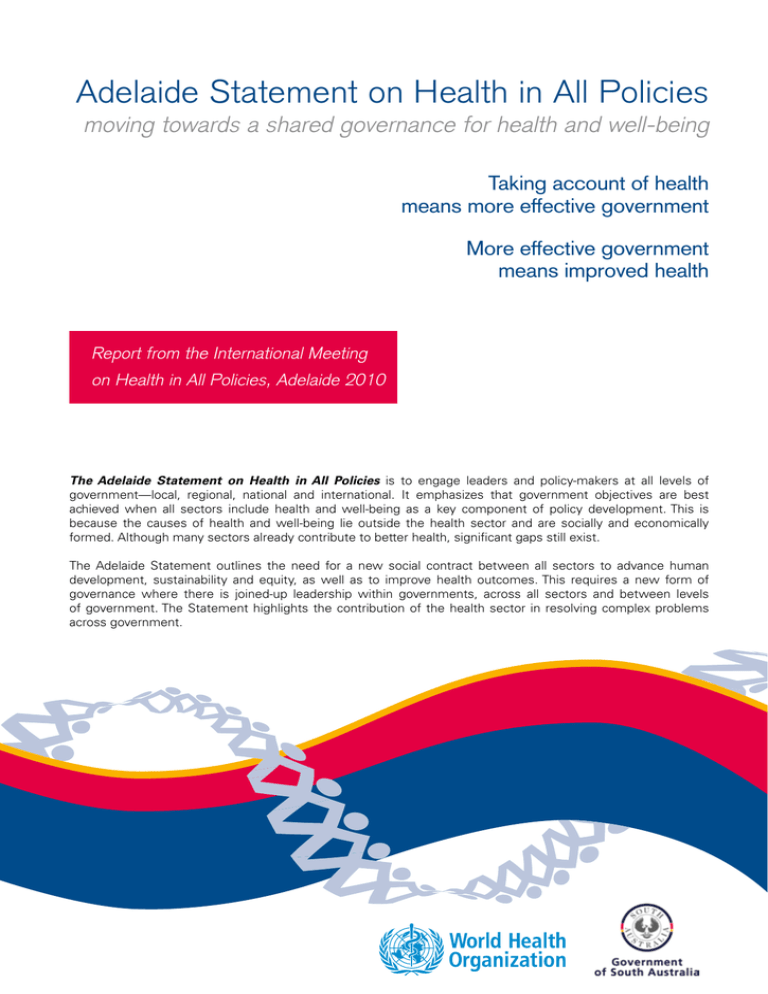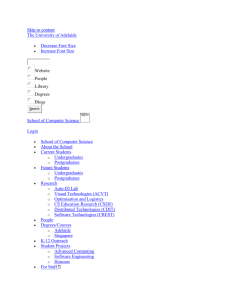
Adelaide Statement on Health in All Policies
moving towards a shared governance for health and well-being
Taking account of health
means more effective government
More effective government
means improved health
Report from the International Meeting
on Health in All Policies, Adelaide 2010
The Adelaide Statement on Health in All Policies is to engage leaders and policy-makers at all levels of
government—local, regional, national and international. It emphasizes that government objectives are best
achieved when all sectors include health and well-being as a key component of policy development. This is
because the causes of health and well-being lie outside the health sector and are socially and economically
formed. Although many sectors already contribute to better health, significant gaps still exist.
The Adelaide Statement outlines the need for a new social contract between all sectors to advance human
development, sustainability and equity, as well as to improve health outcomes. This requires a new form of
governance where there is joined-up leadership within governments, across all sectors and between levels
of government. The Statement highlights the contribution of the health sector in resolving complex problems
across government.
Adelaide Statement on Health in All Policies
moving towards a shared governance for health and well-being
Achieving social, economic and environmental development
A healthy population is a key requirement for the achievement of society’s goals. Reducing inequalities and the
social gradient improves health and well-being for everyone.
Good health enhances quality of life, improves workforce productivity, increases the capacity for learning,
strengthens families and communities, supports sustainable habitats and environments, and contributes
to security, poverty reduction and social inclusion. Yet escalating costs for treatment and care are placing
unsustainable burdens on national and local resources such that broader developments may be held back.
This interface between health, well-being and economic development has been propelled up the political
agenda of all countries. Increasingly, communities, employers and industries are expecting and demanding
strong coordinated government action to tackle the determinants of health and well-being and avoid duplication
and fragmentation of actions.
Need for joined-up government
The interdependence of public policy requires another approach to governance. Governments can coordinate policymaking by developing strategic plans that set out common goals, integrated responses and increased accountability
across government departments. This requires a partnership with civil society and the private sector.
Since good health is a fundamental enabler and poor health is a barrier to meeting policy challenges, the health
sector needs to engage systematically across government and with other sectors to address the health and
well-being dimensions of their activities. The health sector can support other arms of government by actively
assisting their policy development and goal attainment.
To harness health and well-being, governments need institutionalized processes which value cross-sector
problem solving and address power imbalances. This includes providing the leadership, mandate, incentives,
budgetary commitment and sustainable mechanisms that support government agencies to work collaboratively
on integrated solutions.
Health in All Policies approach
The approach described above is referred to as ‘Health in All Policies’ and has been developed and tested in a
number of countries. It assists leaders and policy-makers to integrate considerations of health, well-being and
equity during the development, implementation and evaluation of policies and services.
Health in All Policies works best when:
• a clear mandate makes joined-up government an imperative;
• systematic processes take account of interactions across sectors;
• mediation occurs across interests;
• accountability, transparency and participatory processes are present;
• engagement occurs with stakeholders outside of government;
• practical cross-sector initiatives build partnerships and trust.
Tools and instruments that have shown to be useful at different stages of the policy cycle include:
• inter-ministerial and inter-departmental committees
• cross-sector action teams
• integrated budgets and accounting
• cross-cutting information and evaluation systems
• joined-up workforce development
• community consultations and Citizens’ Juries1
• partnership platforms
• Health Lens Analysis2
• impact assessments
• legislative frameworks
Drivers for achieving Health in All Policies
Building a process for Health in All Policies requires using windows of opportunity to change mindsets and
decision-making cultures, and to prompt actions. Key drivers are context specific and can include:
• creating strong alliances and partnerships that recognize mutual interests, and share targets;
• building a whole of government commitment by engaging the head of government, cabinet and/or parliament,
as well as the administrative leadership;
• developing strong high-level policy processes;
• embedding responsibilities into governments’ overall strategies, goals and targets;
1
2
Citizens’ Juries - www.jefferson-center.org/
Health Lens Analysis - www.health.sa.gov.au/pehs/HiAP/health-lens.htm
2
Adelaide Statement on Health in All Policies
moving towards a shared governance for health and well-being
• ensuring joint decision-making and accountability for outcomes;
• enabling openness and full consultative approaches to encourage stakeholder endorsement and advocacy;
• encouraging experimentation and innovation to find new models that integrate social, economic and
environmental goals;
• pooling intellectual resources, integrating research and sharing wisdom from the field;
• providing feedback mechanisms so that progress is evaluated and monitored at the highest level.
It is not unusual that such a process can create tensions within government as conflicts over values and
diverging interests can emerge. Resolution can be achieved through persistent and systematic engagement
with political processes and key decision-makers.
New role for the health sector
To advance Health in All Policies the health sector must learn to work in partnership with other sectors. Jointly
exploring policy innovation, novel mechanisms and instruments, as well as better regulatory frameworks will
be imperative. This requires a health sector that is outward oriented, open to others, and equipped with the
necessary knowledge, skills and mandate. This also means improving coordination and supporting champions
within the health sector itself.
New responsibilities of health departments in support of a Health in All Policies approach will need to include:
• understanding the political agendas and administrative imperatives of other sectors;
• building the knowledge and evidence base of policy options and strategies;
• assessing comparative health consequences of options within the policy development process;
• creating regular platforms for dialogue and problem solving with other sectors;
• evaluating the effectiveness of intersectoral work and integrated policy-making;
• building capacity through better mechanisms, resources, agency support and skilled and dedicated staff;
• working with other arms of government to achieve their goals and in so doing advance health and well-being.
Next steps in the development process
The Adelaide Statement is part of a global process to develop and strengthen a Health in All Policies approach
based on equity. It contributes to a critical debate that Member States and Regions of the World Health
Organization (WHO) are now engaged in. The Statement reflects the track record of countries that have already
gained experience in implementing such an approach.
The Statement provides valuable input into the World Conference on Social Determinants of Health in Brazil
2011, the 8th Global Conference on Health Promotion in Finland 2013, and preparations for the Millennium
Development Goals (MDGs) post-2015.
Background and acknowledgements
Health is a positive concept emphasizing social and personal resources, as well as physical capacities. Therefore,
health promotion is not just the responsibility of the health sector but goes beyond healthy lifestyles to wellbeing and supportive environments.
The Adelaide Statement was developed by the participants of the Health in All Policies International Meeting,
Adelaide 13–15 April 2010. The Government of South Australia together with WHO invited 100 senior experts
from a wide range of sectors and countries to discuss the implementation of the Health in All Policies approach.
The main aim of the meeting was to move the agenda forward by identifying key principles and pathways that
contribute to action for health across all sectors of government, and engage the health sector in contributing to
the goals of other sectors.
The 2010 meeting drew on the report of the WHO Commission on Social Determinants of Health 2008 and
other significant documents from the ILO, OECD, UNDP, UN-ECOSOC, UNESCO, UNICEF, World Bank and the
World Economic Forum. It was also able to build on earlier work by WHO including the Declaration of Alma-Ata
on Primary Health Care 1978; the Ottawa Charter for Health Promotion 1986; the Adelaide Recommendations
on Healthy Public Policy 1988 and subsequent global health promotion conferences; the Gothenburg Consensus
Paper on Health Impact Assessment 1999; and the Declaration on Health in All Policies, Rome 2007.
Since 2007 the State Government of South Australia has been playing a leading role in promoting knowledge
exchange on Health in All Policies within Australia and internationally. Their initiatives have included holding
a Health in All Policies conference in 2007 to launch their work; providing continuing support to central and
other agencies across their State Government; publishing guidance materials on their methods for Health in All
Policies; and holding the International Meeting on Health in All Policies, co-sponsored with WHO, in April 2010.
3
Adelaide Statement on Health in All Policies
moving towards a shared governance for health and well-being
Examples of joined-up government action
Sectors and
issues
Interrelationships between health and well-being
Economy and
employment
• Economic resilience and growth is stimulated by a healthy population. Healthier people can increase their
household savings, are more productive at work, can adapt more easily to work changes, and can remain
working for longer.
• Work and stable employment opportunities improve health for all people across different social groups.
Security
and justice
• Rates of violence, ill-health and injury increase in populations whose access to food, water, housing, work
opportunities and a fair justice system is poorer. As a result, justice systems within societies have to deal with
the consequences of poor access to these basic needs.
• The prevalence of mental illness (and associated drug and alcohol problems) is associated with violence, crime
and imprisonment.
Education
and early life
• Poor health of children or family members impedes educational attainment, reducing educational potential and
abilities to solve life challenges and pursue opportunities in life.
• Educational attainment for both women and men directly contributes to better health and the ability to
participate fully in a productive society, and creates engaged citizens.
Agriculture
and food
• Food security and safety are enhanced by consideration of health in food production, manufacturing, marketing
and distribution through promoting consumer confidence and ensuring more sustainable agricultural practices.
• Healthy food is critical to people’s health and good food and security practices help to reduce animal-to-human
disease transmission, and are supportive of farming practices with positive impacts on the health of farm
workers and rural communities.
Infrastructure,
planning and
transport
• Optimal planning for roads, transport and housing requires the consideration of health impacts as this can
reduce environmentally costly emissions, and improve the capacity of transport networks and their efficiency
with moving people, goods and services.
• Better transport opportunities, including cycling and walking opportunities, build safer and more liveable
communities, and reduce environmental degradation, enhancing health.
Environments
and sustainability
• Optimizing the use of natural resources and promoting sustainability can be best achieved through policies that
influence population consumption patterns, which can also enhance human health.
• Globally, a quarter of all preventable illnesses are the result of the environmental conditions in which people live.
Housing and
community
services
• Housing design and infrastructure planning that take account of health and well-being (e.g. insulation,
ventilation, public spaces, refuse removal, etc.) and involve the community can improve social cohesion and
support for development projects.
• Well-designed, accessible housing and adequate community services address some of the most fundamental
determinants of health for disadvantaged individuals and communities.
Land and
culture
• Improved access to land can support improvements in health and well-being for Indigenous peoples as
Indigenous peoples’ health and well-being are spiritually and culturally bound to a profound sense of belonging
to land and country.
• Improvements in Indigenous health can strengthen communities and cultural identity, improve citizen
participation and support the maintenance of biodiversity.
Suggested Citation: Adelaide Statement on Health in All Policies. WHO, Government of South Australia, Adelaide 2010.
WHO Library Cataloguing-in-Publication Data
Adelaide statement on health in all policies: moving towards a shared governance for health and well-being.
1.Health policy. 2.Public health. 3.Policy making. 4.Health promotion - organization and administration. 5.National health
programs. I.World Health Organization. II.Title: Health in All Policies, Adelaide 2010, Adelaide, South Australia, 13–15
April.
ISBN 978 92 4 159972 6
(NLM classification: WA 540.1)
© World Health Organization
All rights reserved. Publications of the World Health Organization can be obtained from WHO Press, World Health Organization,
20 Avenue Appia, 1211 Geneva 27, Switzerland (tel.: +41 22 791 3264; fax: +41 22 791 4857; e-mail: bookorders@who.int).
Requests for permission to reproduce or translate WHO publications – whether for sale or for noncommercial distribution –
should be addressed to WHO Press, at the above address (fax: +41 22 791 4806; e-mail: permissions@who.int).
This publication contains the collective views of an international group of experts attending the Health in All Policies
International Meeting, Adelaide 13-15 April 2010, and does not necessarily represent the decisions or the policies of the
World Health Organization or the Government of South Australia.
Printed in Switzerland.
978 92 4 159972 6
4




